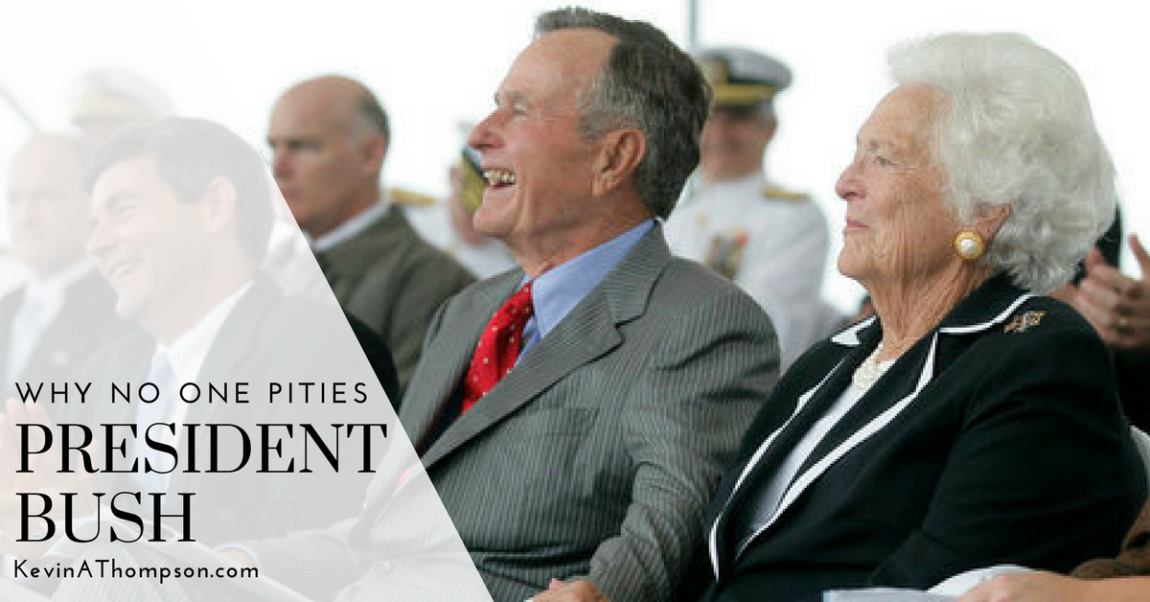Death is expected, especially when it happens to the aged. When a 92-year-old passes from this life to the next, no one is surprised. It’s not even necessary to ask, “What did she die from?” When you are ten years past the average life-span, life can come to a quick end and no one is caught off guard.
Yet these kinds of death are some of the toughest I encounter when the deceased has a living spouse. Maybe I just have a soft spot for the elderly, but to me, few things are as painful as watching an aged man grieving. I still remember kneeling beside my grandfather, looking him in the eye, and telling him that his wife of 70 years was dead. He knew it was coming. There was no surprise. But the grief was as deep and hard as I’ve seen in anyone.
This week former first lady, Barbara Bush, died. At the age of 92, her death didn’t surprise anyone. Maybe the only surprise was that she went before her husband since he has long been in failing health. But as word spread, many reflected on the love and legacy of the Bushes. No one can imagine him without her. From his letters, in interviews, and through many stories, their lifetime love-affair is legendary. We can only imagine how deep is the former President’s grief at the passing of his wife.
But notice something of importance–no one pities President George H.W. Bush. No one looks at their near eight decades together and thinks, “What a waste.” No one believes their lives were poorer because they spent it married to each other. No one believes they would have been richer had they had multiple relationships across the span of their lives. (For more on lasting-love, see my book Friends, Partners & Lovers)
Despite all the change which has taken place defining marriage and regarding societal beliefs about the relationship, there is still something very right about one man and one woman for one life. Obviously, the circumstances of life don’t always allow for this ideal. Death can come far too early. Disease and divorce sometimes rob us of this experience. Yet the ideal has not changed. Fathers don’t dream that one day their daughters will marry multiple men. Mothers don’t hope that one day their sons will sleep with multiple women. No one reasonably looks at a long-married couple sitting on the porch of a nursing home and thinks their lasting love has robbed them of life.
Chase the Ideal
The high view humanity holds of traditional marriage should motivate us. It should drive us to action over apathy. It should move us toward vulnerability with the hopes of making meaningful change. The desire we have to love and be loved for a lifetime should influence how we approach marriage. But for many, it doesn’t. Instead, they treat marriage like weight loss. They wish it could happen, but they make no tangible efforts to change anything. In the absence of effort, they are destined to miss out on the very thing we all desire.
Sadly, work doesn’t ensure the outcome we want. There are exceptions. Some do everything in their power to have a healthy marriage and it just doesn’t happen. A partner has an affair. A spouse refuses to do their part. Or life’s circumstances prevent the connection. But those exceptions should demotivate us. While we should recognize that wise choices don’t guarantee specific outcomes, they do make them far more likely. We should also recognize that foolish choices or apathetic approaches do guarantee a marriage that is far less than it could be.
I don’t know the Bush family personally, but I can almost guarantee one thing–their marriage wasn’t easy. It’s certain that they had moments of difficulty–times he was away at war, the loss of a daughter, the stress of living in the spotlight, and of course George W’s teenage and young adult years. They had their difficulties. Yet they found a way not just to stay together, but to thrive. It probably felt like a gift to them, but it was more than just something they received. It’s something they did. It’s something we should do as well.
If you desire a life-long love, the following actions won’t guarantee it, but they will make it far more possible.
1. Marry wisely. It matters who you marry, so choose wisely.
2. Reject apathy. (See: The Number One Cause of Divorce)
3. Keep growing. (See: The Unseen Reason Relationships End)
4. Suffer well.
5. Don’t just be willing to die for one another, live for one another. (See: Are You Willing to Live for Her?)
As President Bush lays his wife to rest on Saturday, a grateful nation will hurt for him. They will feel for his pain and loss. Many will get emotional seeing his emotion. But no one will pity him. Instead, many will covet what he had–the lifetime love of the woman he loved. If you are married, learn from their example. Allow his loss to remind you of what we should value and then allow those values to motivate you to the right action.




5 Responses to Why No One Pities President Bush